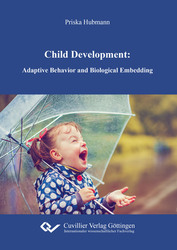| Departments | |
|---|---|
| Book Series (97) |
1381
|
| Nachhaltigkeit |
3
|
| Gesundheitswesen |
1
|
| Humanities |
2369
|
| Medienwissenschaften | 16 |
| Theology | 57 |
| Philosophy | 102 |
| Law | 423 |
| Economics | 851 |
| Social sciences | 417 |
| Sports science | 48 |
| Psychology | 233 |
| Educational science | 190 |
| History | 183 |
| Art | 111 |
| Cultural studies | 166 |
| Literary studies | 117 |
| Linguistics | 88 |
| Natural Sciences |
5408
|
| Engineering |
1795
|
| Common |
98
|
|
Leitlinien Unfallchirurgie
5. Auflage bestellen |
|
Advanced Search
Child Development (English shop)
Adaptive Behavior and Biological Embedding
Priska Hubmann (Author)Preview
Table of Contents, PDF (50 KB)
Extract, PDF (73 KB)
Childhood seems to represent an important timeline of vulnerability. Previous research indicates that first symptoms of many adult psychopathologies such as depression, anxiety, antisocial personality disorders, etc. can already be observed in early childhood. Therefore, it is crucial to understand the dynamics that lead to maladaptive development, known to pose various challenges on individuals, families, and society. Biological embedding is seen as one underlying mechanism. In this process, early childhood adversities are assumed to result in enduring changes in systems responsible for the physiological stability of an organism, which then may have detrimental consequences for the physical and mental health.
The aim of the present thesis was to provide a different perspective on adaptive child development, and how it is influenced by various risk and protective factors. Moreover, it aims to contribute to a better understanding of underlying biological mechanisms, investigating the associations between stress-related biological parameters and risk and protective factors in early childhood.
| ISBN-13 (Hard Copy) | 9783736995055 |
| ISBN-13 (eBook) | 9783736985056 |
| Final Book Format | A5 |
| Language | English |
| Page Number | 150 |
| Lamination of Cover | matt |
| Edition | 1. Aufl. |
| Publication Place | Göttingen |
| Place of Dissertation | Zürich |
| Publication Date | 2017-04-04 |
| General Categorization | Dissertation |
| Departments |
Psychology
|
| Keywords | child development, FKBP5, methylation, nail cortisol concentration, early intervention, adaptive behavior, parental sensitivity,child internalizing and externalizing behavior |








